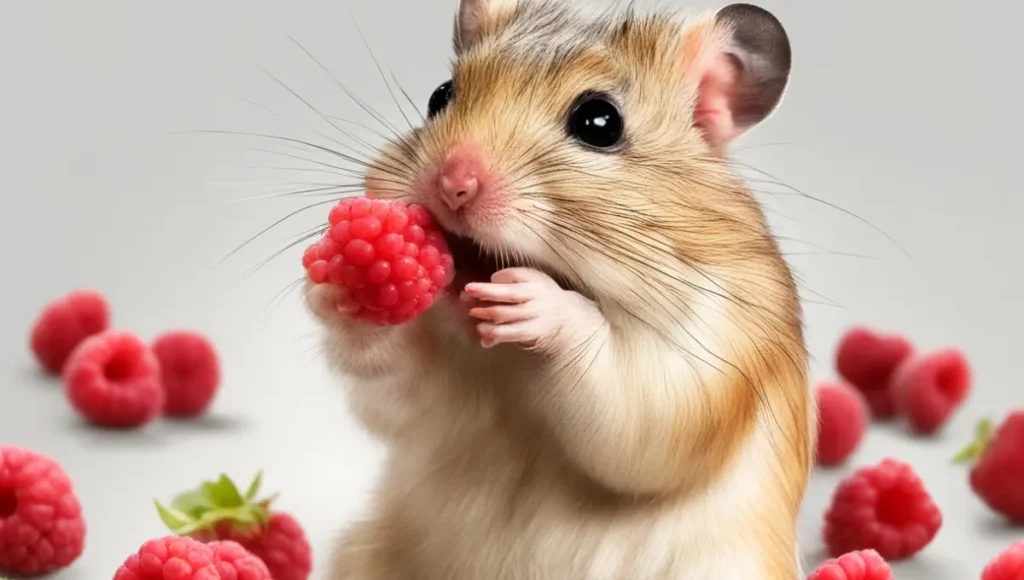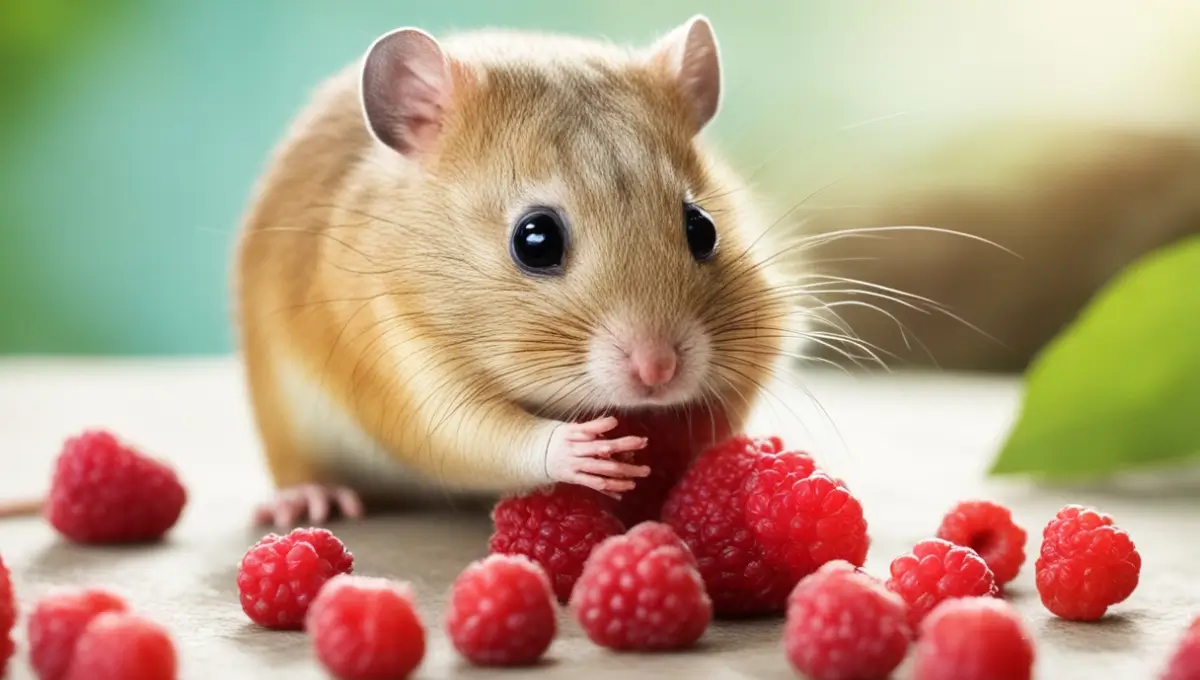If you’re a proud gerbil parent, you’ve probably wondered if your furry friend can enjoy the sweet, vibrant raspberries you love. After all, gerbils are curious little omnivores, always eager to explore new flavors. But can they safely indulge in this juicy treat?
Gerbils have specific dietary needs, and while they do enjoy a bit of variety, it’s crucial to understand what’s healthy for them. Raspberries offer some nutritional benefits, but they also come with certain risks. So, can gerbils eat raspberries? The answer is yes, but there are some important conditions.
The Nutritional Powerhouse of Raspberries
Raspberries pack a nutritional punch, making them a tempting snack for gerbils. These tiny fruits are loaded with:
- Vitamin C: An essential vitamin that boosts the immune system and helps gerbils fight off infections.
- Vitamin K: vital for blood clotting and bone health.
- Fiber: Aids digestion and promotes a healthy gut.
- Antioxidants: These powerful compounds protect cells from damage and may even have anti-inflammatory effects.
| Nutrient | Amount |
|---|---|
| Calories | 64 |
| Carbohydrates | 14.7 g |
| Fiber | 8 g |
| Sugar | 5.4 g |
| Protein | 1.5 g |
| Fat | 0.8 g |
| Vitamin C | 32.2 mg (54% DV) |
| Vitamin K | 9.6 mcg (12% DV) |
| Manganese | 0.8 mg (41% DV) |
| Potassium | 186 mg (5% DV) |
| Magnesium | 27 mg (7% DV) |
While these nutrients sound great for gerbils, it’s important to remember that their natural diet in the wild doesn’t include sugary fruits like raspberries. In the wild, gerbils primarily eat seeds, grains, insects, and some vegetation. Raspberries can complement their diet, but they should never replace their staple food.
Moderation is Key
The biggest concern with raspberries is their high sugar content. Too much sugar can lead to obesity, diabetes, and dental problems in gerbils. That’s why it’s crucial to offer raspberries in moderation, as an occasional treat rather than a daily snack.
Think of raspberries like dessert for your gerbil. They can be a fun and tasty addition to their diet, but they should never be the main course.
Potential Risks of Feeding Raspberries to Gerbils

While raspberries offer some nutritional perks for gerbils, it’s crucial to be aware of the potential risks associated with this sweet treat. Feeding raspberries without caution can lead to health problems for your furry friend.
Sugar Overload
The most significant concern with raspberries is their naturally high sugar content. Gerbils are not equipped to handle large amounts of sugar, and overindulgence can have serious consequences:
- Obesity: Just like humans, gerbils can become overweight if they consume too many sugary treats. Obesity puts a strain on their tiny bodies and can shorten their lifespan.
- Diabetes: Excessive sugar intake can lead to diabetes, a chronic condition that disrupts their body’s ability to regulate blood sugar levels.
- Dental Issues: Sugar is notorious for causing tooth decay and other dental problems in gerbils. This can lead to pain, difficulty eating, and even infections.
Pesticide Exposure
If you’re feeding your gerbil non-organic raspberries, there’s a risk of exposure to pesticide residues. While these chemicals may not harm humans in small amounts, they can be more toxic to gerbils due to their smaller size. If possible, opt for organic raspberries to minimize this risk.
Allergic Reactions
Although rare, some gerbils may have allergic reactions to raspberries. Signs of an allergy can include itching, skin rashes, sneezing, or digestive upset. If you notice any of these symptoms after feeding raspberries, discontinue them immediately and consult your veterinarian.
Other Potential Issues
In addition to the main risks mentioned above, raspberries can cause other problems if fed in excess:
- Diarrhea: The high water and sugar content of raspberries can lead to diarrhea in gerbils if they eat too much.
- Choking Hazard: Make sure to cut raspberries into tiny, bite-sized pieces to prevent your gerbil from choking.
It’s important to remember that these risks are not meant to scare you away from feeding raspberries to your gerbil altogether. Instead, they serve as a reminder to prioritize moderation and caution.
By following safe feeding practices and monitoring your gerbil’s response, you can ensure that raspberries remain a delightful and healthy treat.
How to Safely Feed Raspberries to Your Gerbil?
Ready to share a raspberry with your gerbil? Follow these simple steps to ensure a safe and enjoyable experience for your furry friend:
Preparation is Key
- Thoroughly Wash: Start by washing the raspberries under cool running water. This helps remove any dirt, pesticides, or other contaminants that could harm your gerbil.
- Remove Leaves and Stem: Gently pluck off any leaves or stems from the raspberries. These parts are not easily digestible for gerbils and could cause digestive upset.
- Cut into Small Pieces: Raspberries are a bit too large for gerbils to eat whole. Cut them into tiny, bite-sized pieces to prevent choking. A good rule of thumb is to aim for pieces no larger than a pea.
Serving Size and Frequency
- Start Small: The first time you offer raspberries to your gerbil, start with a very small amount. A tiny piece about the size of a pea is a good starting point.
- Observe for Reactions: After your gerbil nibbles on the raspberry, monitor them closely for any signs of adverse reactions, such as diarrhea or allergic symptoms.
- Increase Gradually: If your gerbil tolerates the raspberry well, you can gradually increase the amount over time. However, even when increasing the portion, always err on the side of caution and avoid overfeeding.
- Occasional Treat: Raspberries should be an occasional treat, not a daily staple. Offer them no more than 1-2 times per week.
Alternatives and Variety
- Other Berries: If your gerbil enjoys raspberries, consider offering other berries like strawberries or blueberries in moderation. Always wash and cut them into small pieces.
- Vegetables: In addition to berries, gerbils can enjoy a variety of safe vegetables like carrots, broccoli, and cucumber.
- Consult Your Vet: If you have any concerns about feeding raspberries or other treats to your gerbil, don’t hesitate to ask your veterinarian for advice.
By following these guidelines, you can safely share the joy of raspberries with your gerbil, enriching their diet with a tasty and nutritious treat.
Additional Considerations to Keep in Mind
While we’ve covered the basics of feeding raspberries to your gerbil, there are a few additional factors to consider:
- Age Matters: Younger gerbils tend to have more sensitive digestive systems and may be more prone to upset tummies from sugary treats. If you have a young gerbil, start with an even smaller amount of raspberry than you would for an adult.
- Health Status: If your gerbil has any pre-existing health conditions, such as diabetes, it’s best to avoid raspberries altogether. The sugar content could exacerbate their condition. Always consult your veterinarian if you’re unsure.
- Variety is the Spice of Life: Even if your gerbil loves raspberries, don’t let them become the only treat they receive. Rotate raspberries with other safe fruits and vegetables to provide a balanced and varied diet.
- Listen to Your Vet: Your veterinarian is the best source of information when it comes to your gerbil’s individual dietary needs. If you have any questions or concerns, don’t hesitate to seek their advice. They can provide personalized recommendations based on your gerbil’s age, health, and overall diet.
By taking these additional factors into account, you can ensure that raspberries remain a safe and enjoyable treat for your gerbil, enriching their life without compromising their health. Remember, a happy and healthy gerbil is a well-fed gerbil!
FAQs
Can gerbils eat raspberry leaves?
Yes, in moderation! Raspberry leaves are safe for gerbils and even offer some additional nutrients. Just like the fruit, wash them thoroughly and offer them in small amounts.
Can gerbils eat frozen raspberries?
It’s best to avoid frozen raspberries, especially if they have added sugar. If you have unsweetened frozen raspberries, thaw them completely before offering them to your gerbil. Make sure there are no ice crystals left, as these could pose a choking hazard.
What other berries can gerbils eat?
In moderation, gerbils can enjoy a variety of berries, including strawberries, blueberries, and blackberries. Remember to wash them thoroughly, remove any stems or leaves, and cut them into small pieces.
Are there any fruits gerbils should absolutely not eat?
Yes, there are a few fruits that are toxic to gerbils and should be avoided entirely. These include citrus fruits (oranges, lemons, limes, etc.) and avocados. Always research a fruit before offering it to your gerbil to ensure it’s safe.
Conclusion
Raspberries can be a delightful and healthy treat for your gerbil when offered with care and caution. Remember the golden rule: moderation is key. A small, pea-sized piece of raspberry once or twice a week is plenty to satisfy your gerbil’s taste buds without jeopardizing their health.
By following the safe feeding practices outlined in this article, you can share the joy of raspberries with your furry friend and provide them with a nutritious and enriching snack. As always, if you have any concerns about your gerbil’s diet, don’t hesitate to consult your veterinarian for personalized advice.
With a balanced diet, plenty of exercise, and lots of love, your gerbil will thrive and continue to bring you years of joy.











